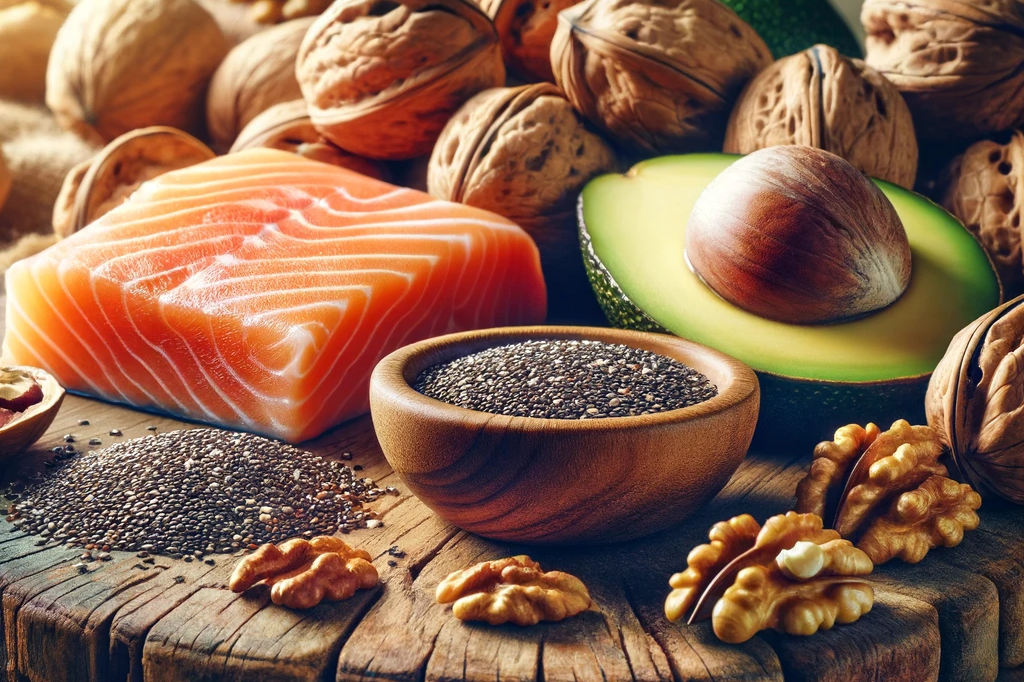Monounsaturated fatty acids

What are monounsaturated fatty acids?
Monounsaturated fatty acids are a type of fat in which carbon atoms in the fatty acid chain are linked together by a double bond. This structure distinguishes them from saturated fatty acids, which have no double bonds, and polyunsaturated fatty acids, which have two or more double bonds. EUFs are typically liquid at room temperature and are valued in the human diet for their ability to reduce the risk of cardiovascular disease. But what about their role in the diet of dogs?
Benefits: Why EUF could be good for dogs
Supporting heart health
Monounsaturated fatty acids can help reduce the risk of heart disease by helping to improve the ratio of LDL ('bad') to HDL ('good') cholesterol in the blood. This is important not only for humans but also for dogs, especially those prone to heart problems.
Promoting a healthy coat and skin condition
Fats play a crucial role in maintaining a healthy coat and skin. Monounsaturated fatty acids can help moisturize the skin and promote a shiny, strong coat.
Weight management
Although fats are high in calories, EUF can help regulate weight as part of a balanced diet. They provide a longer-lasting feeling of satiety, which can be helpful in controlling a dog's body weight.
Disadvantages and risks: Possible concerns
Calorie content
Despite their benefits, EUFs are very high in calories. Excessive intake can lead to weight gain and associated health problems, especially in dogs that are prone to obesity or have low energy requirements.
Unbalanced diet
Too much emphasis on EUF at the expense of other types of fat, particularly polyunsaturated fatty acids (PUFA) and omega-3 fatty acids, can lead to an unbalanced diet. A variety of fatty acids is important to achieve all the health benefits.
Sources of EUF
Not all sources of monounsaturated fatty acids are suitable for dogs. For example, avocado is controversial due to the substance persin, which is toxic to some animals. It is important to choose safe and dog-friendly sources of EUF.
Monounsaturated fatty acids can be a valuable addition to your dog's diet by contributing to heart health, supporting skin and coat and helping with weight management. However, as with all aspects of nutrition, a balanced approach is key. It's important to find the right balance and use safe sources of EUF to maximize the benefits and minimize the risks. A diet rich in a variety of fatty acids, along with an adequate calorie intake and regular exercise, will help your dog live a long, healthy and happy life.
If you notice any signs of hypersensitivity or poisoning in your dog, you should see your vet immediately. We are not a substitute for a vet, but we try to be as accurate as possible. Every dog reacts differently and we recommend you get a second opinion or consult your vet if in doubt.
Stay healthy and take good care of your four-legged friend!😊
Similar to Monounsaturated fatty acids
Saturated fatty acids are fats that have no double bonds between the carbon atoms. This means that they are solid at room temperature and have a high melting point. Saturated fatty acids are mainly...
Polyunsaturated fatty acids are a type of fat found in many food sources and are vital for dogs. Unlike saturated fatty acids, which are solid at room temperature, PUFAs are liquid at room...
Fatty acids are components of fats that are found in various foods. They can be divided into saturated and unsaturated fatty acids. Saturated fatty acids have a solid structure and are usually solid...
Trans fatty acids are a form of unsaturated fatty acids produced by the process of hydrogenation of vegetable oils, a process that produces firmer fats and extends the shelf life of foods. However,...



